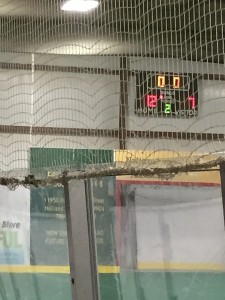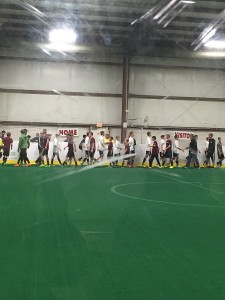 The indoor soccer session is complete and our team’s record is 0-8. The team lost every game, but it was a great season nonetheless. Actually, it was a fabulous season because of the stretch. Through a fluke in the rules, our boys were playing against men (think: facial hair, grown-up swagger, and serious girlfriends in the stands). While this is what we moms recognize that our boys will be someday, ours aren’t there yet, and our 13 and 14-year-olds looked very young racing their 16 and 17-year-old counter parts to the soccer ball.
The indoor soccer session is complete and our team’s record is 0-8. The team lost every game, but it was a great season nonetheless. Actually, it was a fabulous season because of the stretch. Through a fluke in the rules, our boys were playing against men (think: facial hair, grown-up swagger, and serious girlfriends in the stands). While this is what we moms recognize that our boys will be someday, ours aren’t there yet, and our 13 and 14-year-olds looked very young racing their 16 and 17-year-old counter parts to the soccer ball.
What do the boys learn – and what do we all learn – from the stretch?
First, we learn to persevere. The scoring generally came early. At only 10 minutes into the game, it was generally pretty easy to see that the chances of a win were slim, but the skills of hanging in there, persevering, and sticking with it are muscles. And muscles that were definitely worked. Perseverance is important in life too. Sometimes a work project can feel like slogging through the mud, only to be kicked in the teeth, but we have to keep at it – and not give up or lose motivation. It’s the will to carry on that we require, and that we gain, in challenging times.
Also, we learn the value of the team. When the other team scores (and scores and scores) it’s not only about the goalie, it’s also about the defense generally. Or when our own points fail to accumulate, it’s not only about the offensive game, it’s about the team orchestrating its play together. Everyone counts. This idea of teams certainly isn’t rocket science, but it is a life perspective and a life skill, in the same way that a great accomplishment is rarely ours alone, and a failure is rarely a solo act.
We also learn how to be gracious in loss.  Congratulating the winner when you’ve lost the game isn’t easy, but retaining self-assurance, and being genuinely respectful of the other team’s skills and success are a big deal to take forward in life.
Congratulating the winner when you’ve lost the game isn’t easy, but retaining self-assurance, and being genuinely respectful of the other team’s skills and success are a big deal to take forward in life.
And if we’re paying attention, we parents learn something about our roles too. We just have to keep cheering. No matter how challenging it is to watch our kids when they’re struggling, we just have to keep encouraging them. As parents, we have to quickly learn that there are a million things we can’t do for our kids, and that they need to do for themselves. At the indoor soccer match we are sitting behind Plexiglas and all we can do is cheer from the sidelines. And really, that’s all we can do in life too. As good parents, we stay a bit behind some figurative Plexiglas and let our kids struggle. If we rush into rescue, we deny our children the chance to build their own skills and, perhaps more importantly, send a message that we think they can’t handle it on their own. As they grow up, we increasingly have to stay on the sidelines, but we can cheer loudly and often (I also admit to talking a bit of trash – some of the refs’ calls were ridiculous – but that’s another blog).
Stretching is good. This may be the best lesson of all. To only do what we already know that we can, is to deny ourselves – or our kids – the opportunity to grow.
There’s a mental challenge with this one though. It makes a lot of sense to try hard things – and to challenge ourselves. When we do, we have to keep in mind the optimistic possibility that we’ll succeed. We have to believe in our hearts that we will make it. Whether it’s believing we’ll win the soccer game, or having faith that we’ll break into that really tough college, or committing to doing our utmost to get that next job as an important step in our career, we have to believe and commit deeply. Otherwise, why try?
But this is the tricky part. We also have to be prepared to fail graciously. We have to keep both things in mind – the intention and vision of success along with the ok-ness that we may fail. Because losing can’t break us or destroy our spirit. The trying and stretching and reaching has to be its own reward. And this is really, really hard. For kids and parents, for fans and players.
It’s a mental challenge worth pursuing. Someone said that the sign of true genius is being able to hold two totally different truths in mind at once. And I think winning and losing are like this. To believe and pursue and stretch – held in mind with the idea that we are brilliant and incredible humans whether we win or lose at any particular thing.
Perhaps this is the power of an internal compass or faith or spirit (call it what you will, based on your particular faith or religion). What goes on outside of us is important. It is real life. But there is something even more important inside – that is greater than external day-to-day struggles. Call it God or the soul or even character (again, whatever your belief system). It goes on, no matter what’s happening outside. No matter the score or the condition, there is a deeper sense of wholeness that must stretch and try and prevail.
Now they’re teenagers, but when our children were small, they loved to do crafts. We made macaroni necklaces. We drew with finger paints. We pasted packing peanuts into sculptures. I wondered at one point about the value of the activities and honestly, just how many macaroni necklaces I could wear with dignity in public or how many packing peanut sculptures the panache of my home’s décor could accommodate. But my mom reminded me that it isn’t the products, it’s the process. It wasn’t about the necklaces or the sculptures, it was really just about the making, the drawing, and the pasting. It was about the trying and the stretching and the doing – together.
It isn’t about the outcome after all. Playing hard for a great game, regardless of the score; intending for a great college experience, no matter where the acceptance letters come from; and investing ourselves in making a difference in our career, no matter what the outcome of a particular situation.
This is mental fortitude and stretch. And it is faith that the real win is in the stretch itself.

